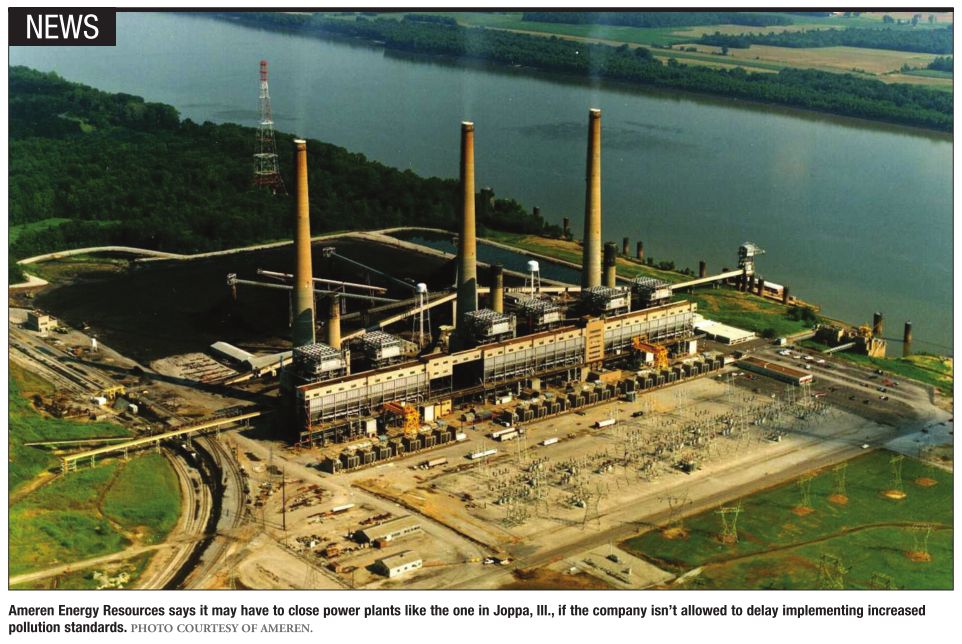
Ameren: Pollution rules threaten jobs
Environmental groups push for enforcement of agreed limits
ENVIRONMENT | Patrick Yeagle
Dozens of people in bright yellow work vests fill seats in the drab blue meeting room at the Illinois Environmental Protection Agency’s building on North Grand Avenue. Many wear expressions of concern, their arms folded, as they sit next to mostly young people in electric blue T-shirts bearing the slogan, “Protect our health, not big polluters.”
It’s a showdown over pollution limits for energy giant Ameren, pitting environmental idealism against potent economic fears.
Ameren Energy Resources (AER) – a subsidiary of St. Louis-based Ameren Corporation – appeared before the Illinois Pollution Control Board on Aug. 1, asking the board for a “variance” that would allow it to delay compliance with tightening pollution standards. The company says it will have to close power plants and cut hundreds of jobs if the previously agreed pollution limits are enforced.
“By seeking relief now, which is critical from a timing standpoint, AER will conserve cash flow and stave off draconian operational measures with the hope that stability will eventually return to the marketplace,” Ameren said in a filing with the Pollution Control Board. Meanwhile, environmental groups say Ameren is pocketing cash and needlessly scaring workers while sloughing off its duties.
“It does seem to be a recurring theme that any time these electric generators need to enact safer controls for pollution, they say they’re going to have to close,” says Tracy Fox, an environmental activist with Peoria Families Against Toxic Waste. “You can go all the way back to when the Clean Air Act went into effect, and it’s been a constant refrain.”
In 2006, Ameren agreed to a state Multi- Pollutant Standard (MPS) regulation that set limits on sulfur dioxide gas and other pollutants. The sulfur dioxide limit, measured in pounds of SO2 per million British thermal units of heat, is supposed to tighten in 2015 and again in 2017. Ameren says low energy prices and other factors have diminished its income and limited its ability to install pollution scrubbers on its Newton Energy Center near Effingham in Jasper County in time to meet the tightening standards.
While Ameren says it is in compliance with the current MPS regulations, the company asked that the stricter 2015 SO2 limit be pushed back to the start of 2020, and asked that the 2017 limit be pushed to the start of 2021. The MPS regulations place all of a given company’s pollution sources statewide under a single set of pollutant limits. If Ameren’s request for a variance is not granted, the company says it will have to close as many as three existing power plants in order to stay within its pollution allotment. That would mean cutting hundreds of jobs at Illinois power plants in Bartonville, Joppa and Newton.
“The mothballing of such facilities would be disruptive to AER and its employees, the local communities, equipment suppliers and contractors, state taxing authorities and already struggling local school districts,” Ameren said in filed documents.
But Tracy Fox, the environmentalist from Peoria, says Ameren knew the risks when it agreed to the MPS regulations, and every other power company is dealing with the same market forces like low natural gas prices and regulations. Fox testified in opposition to Ameren’s request before the Pollution Control Board on Aug. 1, along with several other environmental groups like the Illinois Sierra Club and the Chicagobased Environmental Law and Policy Center.
“In their testimony, Ameren stated this was a ‘black swan’ event; that is, to me, absolutely false,” Fox says. “Every major publication has talked for the past three years about the effects of low natural gas prices on the energy market. Certainly, Illinois’ regulations are not new. They had a long time frame to implement these regulations. I just think to characterize it as a convergence of unforeseeable events is patently ridiculous.”
Contact Patrick Yeagle at [email protected].